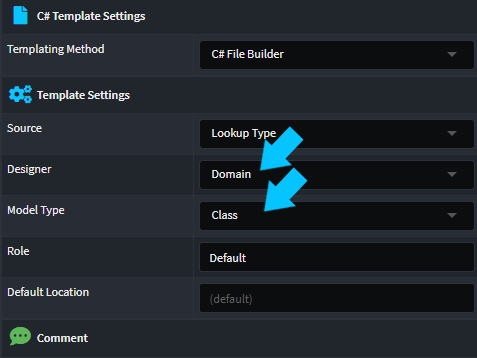Data-binding Designer Models to Templates
When adding Templates to your own module, several template types support data-binding to designer models.
Commonly used templates that support this feature:
- C# Template
- File Template
These templates allow you to select how the data models affect the template by specifying a Type:
- Single File: The template will generate a single file regardless of how many models are bound.
- File Per Model: The template will generate multiple files, one for each model bound.
- Custom: This option allows you to completely customize this process and is beyond the scope of this article.

Next, in the Template Settings, you can specify which Designer and which Model within that designer you would like to data-bind your template to.

Note
If the designer you are looking for is not in the drop-down, make sure you have added the Designer module as a reference. How to Access Designer Models in Templates?
In the above example, we are binding our template to the Domain Designer's Class model. This will set up your template such that the designer model(s) are injected into your template's constructor, as per your selections. Here are examples of what the code would look like:
Single File Template Example:
public partial class MySingleTemplate : CSharpTemplateBase<IList<ClassModel>>, ICSharpFileBuilderTemplate
{
...
// Data-bound designer models
public MySingleTemplate(IOutputTarget outputTarget, IList<ClassModel> model) : base(TemplateId, outputTarget, model)
{
...
}
...
}
File Per Model Template Example:
public partial class MyFilePerModelTemplate : CSharpTemplateBase<IList<ClassModel>>, ICSharpFileBuilderTemplate
{
...
// Data-bound designer model
public MyFilePerModelTemplate(IOutputTarget outputTarget, ClassModel model) : base(TemplateId, outputTarget, model)
{
...
}
...
}
Note
File Per Model templates always require a data-binding, whereas with Single File templates, data-binding is optional. If you do not bind a model, the constructor model parameter will be of type object and have a value of null.
How Can I Filter Which Designer Models are Bound to My Template?
Templates are instantiated through a factory, and this factory is responsible for binding the data. These factories are commonly referred to as template registrations. When you look at the source code for a template, you will notice it has a corresponding template registration file.
Here are examples of the registrations for the above files.
Single File Template Registration (with data bound):
public class MySingleTemplateRegistration : SingleFileListModelTemplateRegistration<ClassModel>
{
...
// Template Factory Method
public override ITemplate CreateTemplateInstance(IOutputTarget outputTarget, IList<ClassModel> models)
{
return new MySingleTemplate(outputTarget, models);
}
// Select which data to bind
public override IList<ClassModel> GetModels(IApplication application)
{
return _metadataManager.Domain(application).GetClassModels().ToList();
}
}
File Per Model Template Registration:
public class MyFilePerModelTemplate : FilePerModelTemplateRegistration<ClassModel>
{
...
// Template Factory Method
public override ITemplate CreateTemplateInstance(IOutputTarget outputTarget, ClassModel model)
{
return new MyFilePerModelTemplate(outputTarget, model);
}
// Select which data to bind
public override IList<ClassModel> GetModels(IApplication application)
{
return _metadataManager.Domain(application).GetClassModels();
}
}
In either scenario, to filter the data which is bound to your template, you can simply alter the GetModels method to apply the desired filter to the data.
Here are some examples:
Simple Filter Sample
This filter will select all Classes which are not abstract.
[IntentIgnore]
public override IList<ClassModel> GetModels(IApplication application)
{
// Return all non-abstract classes
return _metadataManager.Domain(application)
.GetClassModels()
.Where(c => !c.IsAbstract);
}
Complex Filter Sample
This filter will select all Classes which are aggregate roots.
[IntentIgnore]
public override IList<ClassModel> GetModels(IApplication application)
{
// Return all aggregate roots
return _metadataManager.Domain(application)
.GetClassModels()
.Where(c => IsAggregateRoot(c));
}
public bool IsAggregateRoot(ClassModel classModel)
{
AssociationEndModel[] source = (from x in classModel.AssociationEnds()
where x.IsSourceEnd() && !x.IsCollection && !x.IsNullable
select x).ToArray();
return !source.Any();
}
Stereotype Filter Sample
This filter will select all Classes which have the Table stereotype applied.
[IntentIgnore]
public override IList<ClassModel> GetModels(IApplication application)
{
// Return all Classes which have the `Table` stereotype
return _metadataManager.Domain(application)
.GetClassModels()
.Where(c => c.HasTable());
}